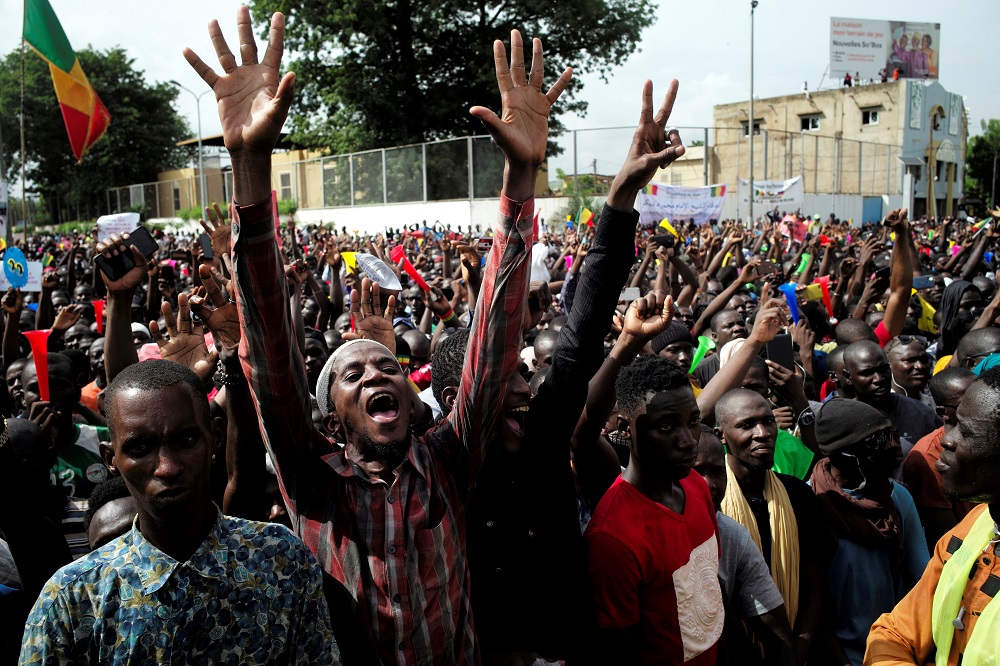BAMAKO (Mali), July 15 — Mali’s protest movement kept up pressure for President Ibrahim Boubacar Keita to resign yesterday, declaring a new rally in memory of protesters killed during recent unrest.
The opposition’s defiant tone against Keita, known as IBK, came after days of protests left at least 11 people dead in clashes with the security forces in the West African state.
“He who asked for us to get killed is no longer our president,” opposition leader Mountaga Tall told reporters.
“We are convinced that President IBK has neither the intellectual nor the physical capacity to lead the country.”
Keita was weighing his options yesterday after the unrest sparked by a contested parliamentary election, but whose underlying causes include discontent over his handling of the country’s jihadist insurgency.
The 75-year-old has made a number of failed overtures to political opponents in recent days, which continues to insist he quit.
Tall, from the so-called June 5 movement behind the protests, urged civil disobedience against the government.
He said that a rally on Friday in central Bamako would be a “ceremony of sacrifice and of prayer” for recent victims.
Bamako was slowly returning to normal yesterday, after days of unrest where witnesses described security forces firing live rounds during protests.
Calm has also returned to the Badalabougou neighbourhood, the stronghold of influential imam Mahmoud Dicko who has emerged as a leader of the protest movement, and the scene of clashes between civilians and security forces on Saturday night.
Badalabougou was just one of the hotbeds of violence that seized various neighbourhoods on July 10, the culmination of a crisis that has alarmed international allies and neighbours that fear the demonstrations could further destabilise the country, one of the poorest in the world.
Far-reaching consequences
The June 5 movement has channelled deep-seated frustrations over a long-running jihadist conflict, economic woes and perceived government corruption.
A rally it called on Friday turned violent after protesters blocked bridges, stormed the premises of the state broadcaster and attacked the parliament building. There were further protests on Saturday.
After the worst civil unrest the country has seen in years, each side has been left facing decisions with far-reaching consequences.
The president has tried to soothe tensions, offering a “consensus government of national unity” and fresh elections in constituencies whose provisional results in the March-April parliamentary elections are disputed.
But the June 5 movement has rejected his attempts.
In another apparent bid to appease the opposition, authorities on Monday night freed all June 5 figures who had been arrested during the protests.
However it appears unlikely that the president will agree to the movement’s long list of demands, which include dissolving the parliament and forming a transitional government — let alone Keita’s resignation.
‘Paths out of crisis’
The international community has meanwhile been trying to defuse the crisis.
On Sunday night, representatives of the United Nations, the European Union, the African Union and West African bloc Ecowas urged Mali to pursue political dialogue.
Condemning “any form of violence as a means of crisis resolution”, they attacked the use of lethal force by the security forces.
They also voiced support for proposals put forward by Ecowas, the 15-nation Economic Community of West African States of which Mali is a member.
Members of these organisations met on Monday with figures from the June 5 movement, and were due to meet again yesterday.
Facing popular anger over the deaths of protesters, Mali’s prime minister on Monday also ordered an investigation into the alleged role of security forces.
Yesterday, his office also asked the security ministry to confirm reports that authorities had deployed an elite anti-terror squad during the unrest. — AFP






















